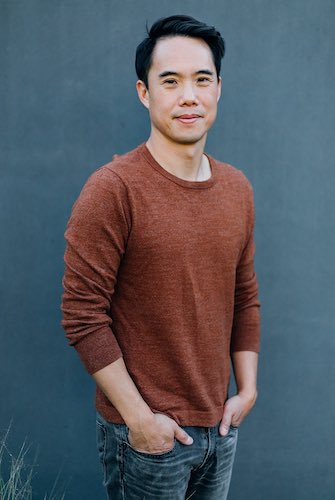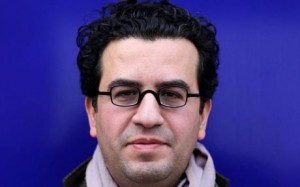
photo credit Clara Molden for The Telegraph
In Anatomy of a Disappearance, Hisham Matar’s eloquent second novel, emotional states characterized by absence—abandonment, yearning, loss—take on unbearable physical weight. For the protagonist, Nuri, who is thirteen when his dissident father is abducted by Muammar Qaddafi’s men, these burdens shape his journey into adulthood and the relationships he negotiates along the way.
But much of the journeying is within. At one point, Nuri waits until his father’s old Cairo apartment is empty before trying on the contents of his abandoned wardrobe. As he slips his arms into one garment after another, he discovers that the clothes have shrunken in the years since his father’s disappearance. He returns an old raincoat to its hanger. Quiet closes in.
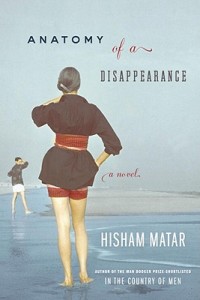 The quality of this silence is perhaps the most striking aspect of Anatomy. Weaving between noisy Arab cities, the cool order of Geneva, and moody English towns, the narrative maintains a lyricism that eases the passage between these highly disparate locales. In prose as clear as the “steel-blue surface of Lake Geneva” but with haunting psychological depths, Matar paints a portrait of a young life shaped as much by love as by impossible yearnings.
The quality of this silence is perhaps the most striking aspect of Anatomy. Weaving between noisy Arab cities, the cool order of Geneva, and moody English towns, the narrative maintains a lyricism that eases the passage between these highly disparate locales. In prose as clear as the “steel-blue surface of Lake Geneva” but with haunting psychological depths, Matar paints a portrait of a young life shaped as much by love as by impossible yearnings.
Anatomy came out in the U.S. in September, one month before the final fall of Libyan dictator Muammar Qaddafi. By the time Matar visited Ann Arbor one month afterward, the country he had left in his youth had changed more rapidly in a few short weeks than it had in the thirty-two years since his departure. Amid all the political upheaval, Matar has been called upon as a cultural ambassador and political commentator, roles he inhabits gracefully if with some reluctance.
Matar’s first novel, In the Country of Men, has been translated into 28 languages, was shortlisted for the 2006 Man Booker Prize, the Guardian First Book Award, and the National Book Critics Circle Award, and has won six international awards, including the Commonwealth Writers’ Prize Best First Book and the Royal Society of Literature Ondaatje Prize. Matar is an adjunct associate professor at Barnard, and splits his time between New York City and London, which has been his primary home since 1986. In late November, we sat down to discuss the impact of the Libyan revolution on his work and his writing, the difference between reading and talking, and why he does not identify as an intellectual.
Interview:
Ilana Sichel: At yesterday’s roundtable you denied thinking of yourself as part of a particular literary tradition. Could you talk more about your resistance to thinking about your work in that light?
Hisham Matar: I don’t walk around thinking of myself as part of a tradition. I don’t, when I write, think that I’m writing within a tradition. If I feel a sense of belonging then I feel a sense of belonging in general to trying to create something that didn’t exist before in the world, and something that might be authentic and whole enough that it may mean something to someone else. There are certain writers and artists and composers that I feel an affinity with, not only their work but the way that they do their work. But I don’t feel that I belong necessarily to them in some tangible way.
Do you resist the idea of belonging to them?
I don’t think so, no. It’s not that I don’t care how people read my work. It’s that I don’t think I should spend any time trying to determine it. Because I don’t have any power over it. And it strikes me as slightly the wrong focus. That my energies would be better spent trying to write the stuff I want to write, which is already very demanding, than trying to determine or second-guess how people will take it or where they will put me. These things move into fashion, so they’re also already very transient. We have many examples of writers who were seen in a certain light, and then after a while were seen in another light. The whole thing is very fickle.
I’m also very aware of the stories that we tell ourselves about our work. What I’m really trying to do is to create the best circumstances that would allow me to write the thing that wasn’t already determined, the thing that I am deeply interested in. And once you get published, at least in my case, those concerns only become pressures. Because people begin to see a pattern, they see, “Oh, you’re this kind of writer. This is what you should do next.” And I resist those very much, and I have various different strategies to block that, to block those demands.
What are your strategies?
They’re very simple. I basically just don’t solicit any advice, either through my publishers or critics or even friends about what they think I should do next. Nothing puts me off more than somebody saying, “You know what? You should write a book about this.” I don’t solicit it not because I’m arrogant and I think I know best. I don’t solicit it because even if they tell me the thing that I think I should write, an immediate resistance arises, no? So for me it has to happen in a space that’s very quiet, protected.
Which is why I keep thinking about what Adorno said about this idea that on some level the world exists against you as a writer. That history is fixed on destroying you, that the world holds a pistol to your head. And therefore you have various different choices. You could write a resistance, but that seems to be an act of fidelity, in a sense, to the thing you’re resisting. Or you could try some way to escape that paradigm, but it seems to me that one of the simplest gestures you can do to try to navigate through that paradigm is not to identify yourself with the pattern that is being imposed on you.
The other reason is that I don’t actually think I am in control. I think that ultimately I write what I’m really interested in, what really provokes me. And I don’t think I have much of a choice. I just try to remain in a place where I am most of all attentive to what I want to do next.
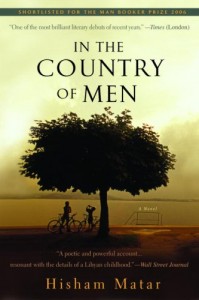 So for example, when I wrote In The Country of Men, which is written through this first person, almost confessional tone, everybody thought that it was my story. And I didn’t see it coming at all. And the fact that it’s not my story, the fact that I’ve made it all up, is really neither here nor there in the sense that the more I said it wasn’t my story, the more people believed that it was. So I thought, actually, I’m wasting my energy, and there’s no point in getting cross about this. There’s no point in seeing it as an accusation about my imagination, or a misreading, a shorthand, lazy way of reading novels. There’s no point dwelling on that, because all it’s doing is upsetting me and distracting me from the thing I want to write next, and when I started writing Anatomy of a Disappearance, I thought, that’s what everybody’s going to say again, because in my case once I wrote my second novel they said, “Oh, this is his story.” And there was a moment when I was writing Anatomy of a Disappearance that I guessed that’s what they were going to say, and I was very determined not to let that affect what I do. Because the real freedom is not to respond to that expectation. And to put it into perspective, some of the things I wrote in The Country of Men have created arguably bigger and much more tangible dangers for me personally.
So for example, when I wrote In The Country of Men, which is written through this first person, almost confessional tone, everybody thought that it was my story. And I didn’t see it coming at all. And the fact that it’s not my story, the fact that I’ve made it all up, is really neither here nor there in the sense that the more I said it wasn’t my story, the more people believed that it was. So I thought, actually, I’m wasting my energy, and there’s no point in getting cross about this. There’s no point in seeing it as an accusation about my imagination, or a misreading, a shorthand, lazy way of reading novels. There’s no point dwelling on that, because all it’s doing is upsetting me and distracting me from the thing I want to write next, and when I started writing Anatomy of a Disappearance, I thought, that’s what everybody’s going to say again, because in my case once I wrote my second novel they said, “Oh, this is his story.” And there was a moment when I was writing Anatomy of a Disappearance that I guessed that’s what they were going to say, and I was very determined not to let that affect what I do. Because the real freedom is not to respond to that expectation. And to put it into perspective, some of the things I wrote in The Country of Men have created arguably bigger and much more tangible dangers for me personally.
Because of the political content?
I didn’t set out to write a book that was trying to make a political statement or trying to reveal the reality of life under Qaddafi. I was concerned with much less grand kinds of things. I was concerned with art. But once I did it and I realized the kinds of dangers it was going to put me in, I had a choice: I could edit those things out. I could act as my own censor, my own oppressor. And I didn’t do that. And sometimes I wonder, even now, whether that was actually a prudent thing to do.
You wonder if retaining the political content was imprudent?
I really judge the work to be supreme over my own interests and my own well-being, and even the well-being of people I know, which is much more complicated—and I’m still not sure about that judgment. That to me puts all of this stuff into perspective, in the sense that when you write, one of the things that you have to create for yourself is a state of absolute freedom. And that state of absolute freedom will inevitably be compromised if you’re thinking about what tradition you’ll be read in, how will people read you, who’s my gang—or, will I get punished for this, will I get criticized for this, will the bookshops accept it? All of that, to me, exists in one room. It’s all pointing to compromising that state of freedom.
Even if I were to go around wanting to place myself and my work in a certain tradition, I don’t think I would judge it correctly. I think I am the least authoritative person on the narrative. I exist on a slightly different plane. I am the mechanic. And asking the mechanic if this car will make it from here to there is an appropriate question. But asking the mechanic, “Will it be a happy trip? Will we enjoy ourselves?”—that is an inappropriate question. I am hyperaware of the modesty of my powers.
Your reluctance to think about your work in its critical context raises the dilemma of writer as critic. Writers cut their teeth on reading others’ work, and practically speaking, many make careers as critics and teachers. For instance, you’re teaching this course on literature of exile at Barnard. Can you really avoid looking at you own work through the same lenses you turn on others’?
You do it, but not in the same way. You are critically reading your work, and editing it and making sure that it’s working, but it’s a very different engagement than reading a novel by someone else. And you’re reading it when it’s not done. You’re reading as somebody who’s engaged in the production, whereas when you read a novel that’s done, it’s finished, and once my books are finished, I never read them. I would argue even that I can’t read them.
What about when you give readings?
Yes, but that’s different.
In that it’s a sort of performance? 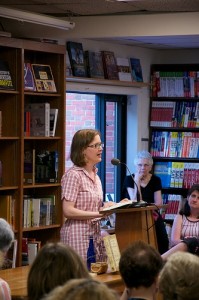
Yes, in a way. But I prefer reading to talking. Reading seems to make sense to me. I enjoy hearing an author read because I can see where they place the stresses, how the prose sounds in their heads. It seems to reveal something about that prose and allows me access into it.
The trouble with talking, and with questions, is that you are really in a very different space once you’re being asked about the book. And writing a book is not like taking a trip. Taking a trip you can say, well you were on the trip and now you’re not, and I want to know how the trip went. So why talk?
It seems that part of the problem is the medium. That you’re using words to talk about words. Could you imagine adapting one of your novels or stories into a film?
 I can’t. It’s a novel because that’s how I imagine it, and I can’t imagine it in any other way. But if somebody says, I want to make a film out of this, to me it’s an artist responding to another work, and I am very interested in whoever wants to make a film to be as free as possible. Someone wants to write a piece of music inspired by Anatomy of a Disappearance, and that’s very exciting to me.
I can’t. It’s a novel because that’s how I imagine it, and I can’t imagine it in any other way. But if somebody says, I want to make a film out of this, to me it’s an artist responding to another work, and I am very interested in whoever wants to make a film to be as free as possible. Someone wants to write a piece of music inspired by Anatomy of a Disappearance, and that’s very exciting to me.
Several years ago an American producer wanted to make a film of In the Country of Men. Most of the novel takes place in Libya, and a little of it in Egypt. There are no western characters. They seemed sincere and serious about it, but they wanted to do it with American or English-speaking actors, in English. And that’s a problem.
Why?
Because as a novel somehow the language isn’t so much an issue. Writing in English doesn’t make me question its authenticity. But when you have actors playing Libyan characters but talking in a different language, that would make me question authenticity.
What is it about a novel that doesn’t make you question the authenticity?
There’s something about them that exists in the head almost, even when you’re reading the language. I’m not entirely sure.
With literature we have the sense of accessing interiority in a way that feels less mediated than film. Perhaps that, too, is a grand illusion that just seems slightly more modest because it’s happening on the page.
I just know that when I go to a cinema and watch a specific story, set in a specific time and place, and it’s done in this other tongue, I don’t really know what I’m watching anymore. I can’t help but feel an interpretation taking place. Or a translation. But with novels I don’t feel that.
On a different note, I’m curious about how the revolution affects your sense of yourself and your work as a Libyan writer, and if there’s been a change?
It’s too soon to say exactly, but I know that it challenged that place from which the writing comes, that quiet place—in a way that is incredibly practical and not abstract at all. There was so much noise and urgency and news and talk and violence that I just felt I was unable to work on fiction for months. I was working on op-eds, on essays, but the public nature of that sort of writing works against the other space, and interferes with it.
But I don’t feel that it has yet come into my thoughts in the sense of what book to write or that I feel I should respond to it, maybe because I’m hyperaware of the fact that novels respond not just very slowly, but very indirectly, and that they’re strongest when they don’t try to address a particular event, but to incorporate, digest, a certain moment, or a certain circumstance, and bring it out in a different way. So I feel that it would be perfectly appropriate to write a novel now about a couple living in Zurich, in the sense that I don’t feel obliged to rush and write a novel about the revolution. I don’t know in what other ways it’ll influence things. I suspect it’ll take a long time for the ripples to settle.
It certainly had some influence on my sense of identity, in the sense that you actually forget that dispossession is possession, that not having a country is something you work at. You work to endure it, you work to accommodate it in your life. And once that changes, and the possibility of returning opens, and the possibility of engagement as a citizen becomes viable and full, then it’s possession but it feels like dispossession also because this thing that you have learned all of your life how to do is no longer required and then you suddenly realize that on some level your sense of estrangement, or exile, is on a completely different level.
Do you think about going to Libya now? Could you imagine yourself making a life there?
I haven’t been to Libya in thirty-two years. It’s very difficult to imagine what going back would be like. I know a lot of Libyans like me who have been abroad for so long and have projected very clear kinds of  objectives about what would happen to their personal lives, where they might move to, if they lived there. Would they go back and forth? Would they have certain expectations or desires or hopes? And I’m surprised that I haven’t done that.
objectives about what would happen to their personal lives, where they might move to, if they lived there. Would they go back and forth? Would they have certain expectations or desires or hopes? And I’m surprised that I haven’t done that.
All of these years I’ve been carrying with me the Libya that I remember, which is no longer, by definition. And so going back risks erasing that Libya totally. And I’m not a man of action. This is a good time for a man of action. Men of action are all walking around very enthused and excited and purposeful. And they’re needed in times like these. And there’s a great sense of vitality and energy to be had by that. But I’m not like that, so things are slightly more complicated.
There’s that line in the story you read yesterday—I don’t remember exactly how it goes, but there was this idea about the intellectual not being a man of action and I was wondering how much you identify with that line.
I admire intellectuals but I don’t feel I am one. I think of myself as an artist who is using words.
There are so many different definitions of an intellectual, but one of the possible definitions is sort of a moralist in the French tradition, the sense that you are attending to current events and calling things by their name. I’ve done a lot of this recently, but I never feel I am in my skin when I do it. I do it out of a sense of civic obligation. So I think somebody like Albert Camus was an intellectual. Edward Said was an intellectual. These people I admire, hugely, but I don’t think I am like that. Part of me wishes I was but, to be honest, I am very content with the silence and solitude and the uncertainty of writing novels. Novels can be loud and certain, but the act of doing—I like that space. It’s soothing to me. There’s something intellectually very exciting about it. If I had the deliberate will to be a commentator on my time in a direct journalistic way, then perhaps I might think of myself as an intellectual, which was why it was very bizarre when the New York Times said something about me as an ambassador –someone well positioned to be a cultural interpreter.
The review did seem really committed to seeing you as a sort of representative.
It was a review that was written through current affairs. And that is a problem. Novels can respond to current affairs, but I don’t think of my novels that way. Several people have remarked on what a great fortune it is that my book came out at this time. But I feel the opposite. I feel like you have this child and you take them to school and for their first day at school, like the day the book got published, you discover that it’s not a school at all, that it’s a political demonstration, and it’s very loud, and they’re trying to find their way, but they’re lost among the crowd. Many people are coming to the book with that noise around it, and I feel that’s not the nature of this book.
And this comes back to your question about trying to create the circumstances under which one’s work is read and received, in the sense that I truly think I have very little choice in the matter. I have to delude myself into believing the book will remain in print for long enough that people can return to it under quieter skies. Having said all of that, I do feel a deep connectedness to my country. As an individual, as a citizen, I feel deeply bound to it in some way. But that connectedness doesn’t come without a grudge.





